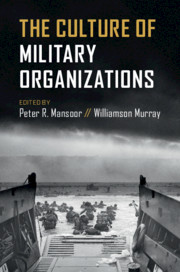Crossref Citations
This Book has been
cited by the following publications. This list is generated based on data provided by Crossref.
Stanley-Lockman, Zoe
2021.
From closed to open systems: How the US military services pursue innovation.
Journal of Strategic Studies,
Vol. 44,
Issue. 4,
p.
480.
Jackson, Aaron P.
2022.
Handbook of Military Sciences.
p.
1.
Nisser, John
2023.
Conceptualizing doctrinal rejection: a comparison between Active Defense and Airland Battle.
Defence Studies,
Vol. 23,
Issue. 2,
p.
274.
Lucas, Jeffrey W.
Hanges, Paul J.
Beavan, Kelly
Epistola, Jordan
Forgo, Emily
and
Shapiro, Debra L.
2023.
Perceptions of Espoused Versus Enacted Culture Around Sexual Misconduct and Other Offenses Among U.S. Military Service Members.
Armed Forces & Society,
p.
0095327X2311534.
Borchert, Heiko
2024.
The Very Long Game.
p.
1.
Nisser, John
2024.
Aligning tactics with strategy: Vertical implementation of military doctrine.
Journal of Strategic Studies,
Vol. 47,
Issue. 4,
p.
451.
Seliuk, Volodymyr
2024.
FORMATION OF CORPORATE CULTURE OF OFFICERS: FOREIGN EXPERIENCE.
Bulletin of Alfred Nobel University Series "Pedagogy and Psychology»,
Vol. 1,
Issue. 27,
p.
66.
Hood, David
2024.
Risk Management or Risk Myopia: Changing the Acquisition Risk Management Mindset of the Australian Defence Force.
Contemporary Issues in Air and Space Power,
Vol. 2,
Issue. 1,
p.
bp39360470.
Sjøgren, Søren
2024.
What we disagree about when we disagree about doctrine.
Journal of Strategic Studies,
Vol. 47,
Issue. 4,
p.
474.
Schneider, Jacquelyn
and
Macdonald, Julia
2025.
The Hand Behind Unmanned.
Webeck, Sean
and
Banerjee, Vasabjit
2025.
Accountability, Bureaucratic Discretion, and Civil-Military Relations.
Armed Forces & Society,
Wallin, Mathias
2025.
Fighting to adapt: a study of the relationship between organizational culture and cognitive flexibility in Swedish army brigades.
Defence Studies,
Vol. 25,
Issue. 1,
p.
212.
Vana, Noa
Kraus, Shane W.
Way, Bailey M.
Jennings, Todd L.
and
Gavriel-Fried, Belle
2025.
Barriers to Gambling Treatment Among American Military Personnel: A Qualitative Study.
Journal of Gambling Studies,



